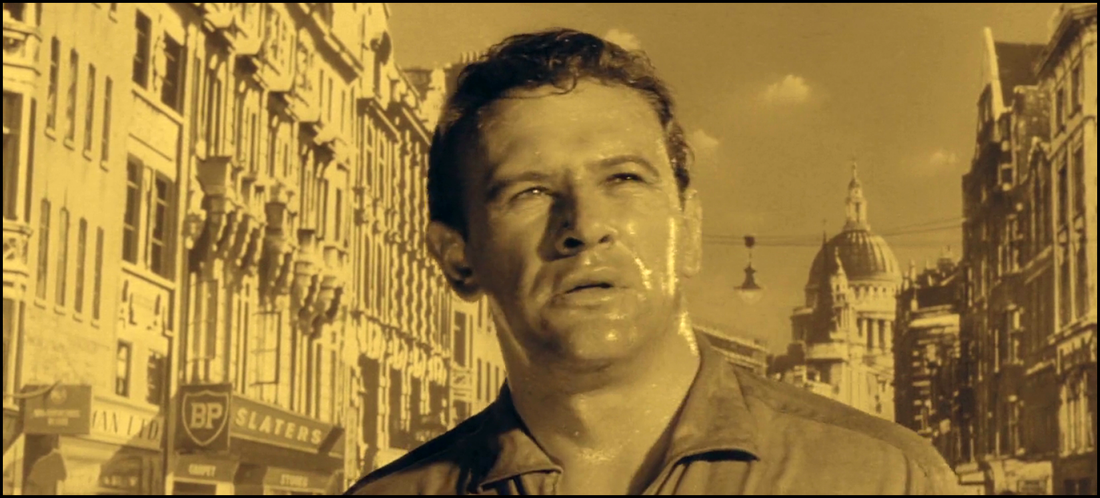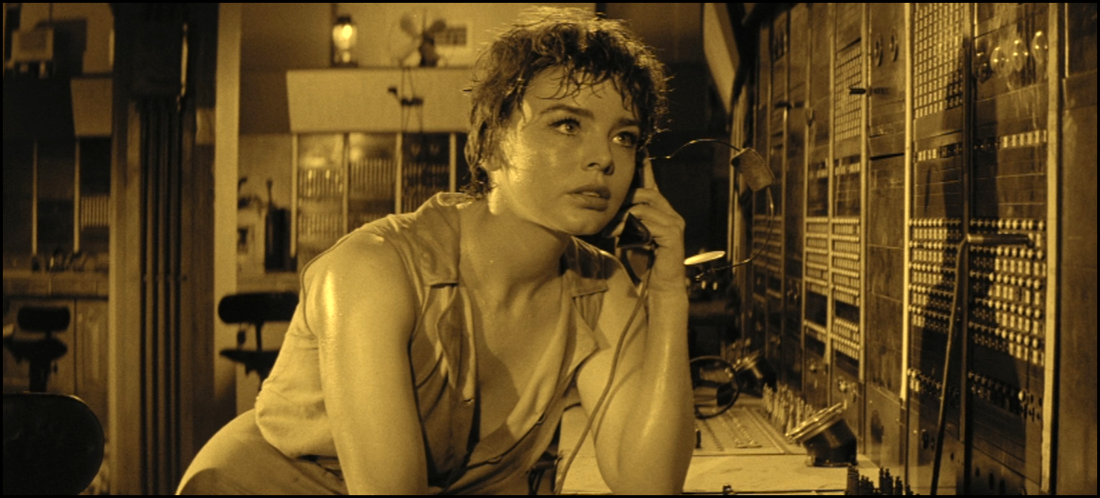That’s the thing about ‘End Times’ prophecies and predictions: they rarely come true. This isn’t because of a lack of critical, scientific thinking; rather it’s tied to the fact that – more often than not – fear of the unknown creeps in from the margins, causing even the most rational mind to occasionally propose some semi-ridiculous consequences to attempting anything. I can’t tell you what lead “the best minds known to man” to suggest that we were going to set our own air ablaze, but dare I suggest it wasn’t a logical position? Yes, yes, yes: I get that we never knew the outcome as we’d never set off a bomb of this proportion, but I’m still inclined to believe such a conclusion was founded more on panic than anything else.
Still, it’s this kind of exaggerated thinking that fuels a film like The Day The Earth Caught Fire.
Without spoiling too much in this preamble, the prophetic film goes so far as to suggest that twin nuclear tests (conducted by the United States and the Soviet Union) were not only the catalyst for changing Earth’s axis but also shifting our planet’s orbit around the sun, sending us on a crash course right into the blazing heart of our star system itself! Released in 1961, it’s easy to suggest that its premise was conceived of during the Cold War – a time when the collective fear of atomic weapons was at its highest – so perhaps everyone needed to be aware of just how frightening the prospect of a nuclear exchange was perceived by the masses.
After all, fear of this unknown couldn’t only move mountains. It might destroy them.
(NOTE: The following review will contain minor spoilers necessary solely for the discussion of plot and/or characters. If you’re the type of reader who prefers a review entirely spoiler-free, then I’d encourage you to skip down to the last few paragraphs for my final assessment. If, however, you’re accepting of a few modest hints at ‘things to come,’ then read on …)
From the film’s IMDB.com citation:
“When the U.S. and Russia unwittingly test atomic bombs at the same time, it alters the nutation (axis of rotation) of the Earth.”
I hate picking on thoughtful motion pictures, and The Day The Earth Caught Fire really did have its heart in the right place.
It’s best to approach the film by thinking of it as ‘an activist’s picture.’ Clearly, screenwriters Wolf Mankowitz and Val Guest (who also directed) were trying to breach the topic of nuclear supremacy not so much from the proposition of it spelling our doom and gloom but to merely lay out what they projected could be one probably scenario from crossing the Rubicon (i.e. point of no return). They very well may have wanted to tell a good story, but – like any advocate – they were more likely hoping that a groundswell of support from the viewing audiences around the world may’ve paved the way for a constructive (and public) conversation about atomic energy and what its unchecked growth might do to Mother Earth.
Why do I say this?
Now, there’s nothing wrong with those efforts, and I applaud everyone involved for doing so. It would’ve been easy to cross over into the realm of propaganda (with just a few story twists) and start advocating one position over another. While I suspect all involved were likely opposed to nuclear power, I’m glad they didn’t repeatedly pound that drum the way the current crop of Hollywood (and beyond) scribes tend to do. Instead, Mankowitz and Guest present their doomsday scenario, and they let you decide what to make of it. Bravo!
Along the way, their script actually creates a handful of solid characters who don’t so much come into conflict as they do bounce around a bit off the subject matter. (In fact, if I have any major complaint regarding Day’s script, it’s that there’s really no central conflict. Instead, we’re given a rather chatty melodrama – with a romantic subplot – and a wealth of conversation.) Peter Stenning (played by Edward Judd) is a crack reporter who’s kinda/sorta lost his storytelling mojo when it looks like the end of the world might just be what he needed to discover himself all over again. Jeannie Craig (the lovely Janet Munro) is telephone operator who unintentional eavesdropping (of the extinction level event) sets all of this in motion. Bill Maguire (Leo McKern) is the old school newspaperman who’s grown a bit weary with the routine of his job but – against all odds – continues to fight the ‘good fight’ against the establishment, especially now when it appears they’re trying to conceal the facts of Earth’s pending demise from the reading public.
Though there are a few more faces to round out this ensemble, these three characters represent the lion’s share of the flick’s best moments. Sadly, there’s little conflict for them to actively engage one another with, and instead they’re more like boats against the tide of events – tossed a bit here and there when circumstances require but always plowing toward the shore. Once the central struggle – that of Earth’s fate – is revealed, they do have a bit more substance to chew on: the inevitable rioting of citizens acting out against all efforts to maintain civility makes for a few good sequences, but at that point the writing was on the wall, as they say.
Still, this has to be one of the chattiest ‘end times’ films ever made, and the British propensity to talk things up gets a wonderful visual retort when Judd walks silently through the emptied city streets in the picture’s opening and closing moments. The silence – for the most part – is deafening, especially when juxtaposed with the flick’s nearly endless speechifying. In fact, you’re almost glad the Apocalypse is here just for the peace and quiet.
The Day The Earth Caught Fire (1961) was produced by Pax Films.
Mildly recommended. So long as you don’t mind being talked to death through the Apocalypse, then The Day The Earth Caught Fire might tickle your fancy. There’s very little action – this is a thinking man’s end of the world – but more than a fair amount of verbal ruminating along with some nice characterizations from actors Judd, Munro, and McKern. The film is also bookended with an interesting colorization that kinda/sorta suggests “we’re all doomed” without screaming it from the rooftops and street corners, though the picture does have a bloke doing that at the appropriate moments as well.
-- EZ



 RSS Feed
RSS Feed